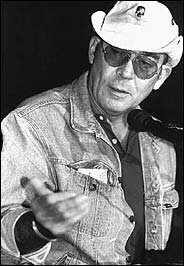Mon 21 Feb 2005

Hunter S. Thompson (Michael R. Brands/Associated Press)
MICHELLE O’DONNELL, The New York Times, reports:
Hunter S. Thompson, the maverick journalist and author whose savage chronicling of the underbelly of American life and politics embodied a new kind of nonfiction writing he called “gonzo journalism,” died yesterday in Colorado. Tricia Louthis, of the Pitkin County Sheriff’s Office, said Mr. Thompson had died of a self-inflicted gunshot wound at his home in Woody Creek, Colo., yesterday afternoon. He was 65.
Mr. Thompson, a magazine and newspaper writer who also wrote almost a dozen books, was perhaps best known for his book, “Fear and Loathing in Las Vegas,” which became a Hollywood movie in 1998. But he was better known for his hard-driving lifestyle and acerbic eye for truth which he used in the style of first-person reporting that came to be known as “gonzo” in the 1960’s, where the usually-anonymous reporter becomes a central character in the story, a conduit of subjectivity.
“Nobody really knows what it means, but it sounds like an epithet,” he said in an interview that, for him, journalism “can be an effective political tool.”
Hunter Stockton Thompson was born in Louisville, Ky, on July 18, 1939, the son of an insurance agent. He was educated in the public school system and joined the United States Air Force after high school. There, he was introduced to journalism, covering sports for an Air Force newspaper at Eglin Air Force Base in Florida. He was honorably discharged in 1958 and then worked a series of jobs writing for small-town newspapers.
It was in the heat of deadline that gonzo journalism was born while he was writing a story about the Kentucky Derby for Scanlan’s magazine, he recounted years later in an interview in Playboy magazine.
“I’d blown my mind, couldn’t work,” he told Playboy. “So finally I just started jerking pages out of my notebook and numbering them and sending them to the printer. I was sure it was the last article I was ever going to do for anybody.”
Instead, he said, the story drew raves and he was inundated with letters and phone calls from people calling it “a breakthrough in journalism,” an experience he likened to “falling down an elevator shaft and landing in a pool of mermaids.”
He went on to become a counter cultural hero with books and articles that skewered America’s hypocrisy.
“He wrote to provoke, shock, protest and annoy,” Timothy Crouse wrote in his book “The Boys on the Bus,” about the 1972 presidential campaign.
Mr. Thompson influenced a generation of writers who saw in his pioneering first-person, at times over-the-top writing style.
As a young man, he was heavily influenced by Jack Kerouac and wholeheartedly followed Kerouac’s approach in which the writer revels in his struggles with writing.
Among his books were “Hell’s Angels,” “Fear and Loathing in Las Vegas,” “Fear and Loathing on the Campiagn Trail ‘72,” “The Great Shark Hunt,” “Generation of Swine” and “Songs for the Doomed.”